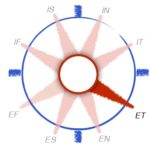In its essence this thinking is no less fruitful and creative than introverted thinking, it merely serves other ends. — C. G. Jung
Extraverted thinking is markedly different from introverted thinking, considered in the last article. Introverted thinking is highly conceptual, seeking to clarify an emerging idea. Extraverted thinking is in the world dealing with objects, data, things, seeking to organize the chaos of many particular facts. We could call it “constructive thinking” for the way it assembles new order.
Extraverted Thinking: The Constructive Gifts
 Extraverted thinking is oriented to objective data. It applies its logical orientation to the things of the world. Those “things” might be tools, data, operating procedures, trucking routes, or people. For extraverted thinking, they are all objects in need of constructive order.
Extraverted thinking is oriented to objective data. It applies its logical orientation to the things of the world. Those “things” might be tools, data, operating procedures, trucking routes, or people. For extraverted thinking, they are all objects in need of constructive order.
“Cold,” says the feeling side–“cold and uncaring.” True. But it is not the function of thinking to care, only to logically analyze and construct.
When thinking is drawn outward to the external world, its attention is to the many facts, objects, and data found there. Even ideas, as long as they already exist as well accepted ideas, are considered among the various facts to which thinking can be applied.
The role of this type is “. . . to make all activities dependent on intellectual conclusions, which in the last resort are always oriented by objective data, whether these be external facts or generally accepted ideas” (CW 6, par. 585).
For introverted thinking, facts are merely incidental, but for extraverted thinking, they are primary. It is dependent upon them to construct order.
“It almost seems as though [extraverted thinking] were a mere sequela of external facts . . . It seems to be constantly affected by the objective data and to draw conclusions only with their consent” (CW 6, par. 580).
Extraverted thinking assembles the facts of experience–rules, data, traditions, standards, theories, people–and organizes them. It is perpetually poised to apply logic in the world.
We can thank the people endowed with the constructive gifts for the orderly infrastructures that sustain and advance science, industry, organizations, government, and civilization itself.
J G Johnston
Author of Jung’s Indispensable Compass
5/1/2013
